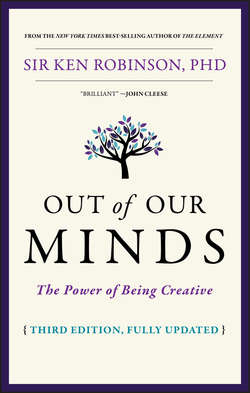Out of Our Minds

Реклама. ООО «ЛитРес», ИНН: 7719571260.
Оглавление
Робинсон Кен. Out of Our Minds
ACKNOWLEDGMENTS
ABOUT THE AUTHOR
PREFACE TO THE THIRD EDITION
1. OUT OF OUR MINDS
CREATING THE FUTURE
RETHINKING CREATIVITY
THREE THEMES
ONLY CONNECT: EDUCATION, BUSINESS AND CULTURE
BEYOND IMAGINING
2. FACING THE REVOLUTION
OUT AND ABOUT
GETTING THE MESSAGE
IT’S ONLY JUST BEGUN
USING YOUR BRAIN
IT’S GETTING CROWDED
THE PERILS OF PREDICTION
THE LEISURED SOCIETY?
ANTICIPATING THE FUTURE
LOOKING FORWARD
3. THE TROUBLE WITH EDUCATION
ACADEMIC INFLATION
TWIN PILLARS
THE CULTURE OF EDUCATION
THE SEPTIC FOCUS
ECONOMIC CHALLENGES
CULTURAL CHALLENGES
PERSONAL CHALLENGES
TAKING STOCK
4. THE ACADEMIC ILLUSION
JOIN THE CLUB
AS A MATTER OF FACT
MEASURING YOUR MIND
THE TRIUMPH OF SCIENCE
BORN AGAIN
THE RISE OF EDUCATION
THE IRRESISTIBLE RISE OF IQ
THE NARROWING OF INTELLIGENCE
CHANGING OUR MINDS
5. KNOWING YOUR MIND
LIVING IN TWO WORLDS
MAPPING THE MIND
DIVERSITY
DYNAMISM
DISTINCTIVENESS
PLASTICITY AND POTENTIAL
DARRYL’S DANCE
REALIZING WHO WE ARE
6. BEING CREATIVE
THE VEIL OF CONCEPTIONS
SPEAKING YOUR MIND
WHAT DO YOU MEAN?
YOUR CREATIVE MIND
IMAGINATION, CREATIVITY AND INNOVATION
THE CREATIVE PROCESS
JUDGING VALUE
FREEDOM AND CONTROL
THIS TIME IT’S PERSONAL
CONCLUSION
7. FEELING BETTER
THE EXILE OF FEELING
THE PERSONAL GROWTH MOVEMENT
EMOTIONAL DISTURBANCE
SOFT SKILLS
TWO TRADITIONS
EDUCATING THE EMOTIONS
KNOWING AND FEELING
ARTISTS AND SCIENTISTS
CONCLUSION
8. YOU ARE NOT ALONE
THE LONE GENIUS?
A MATTER OF TIME
DYNAMIC CULTURES
DISTINCT DIFFERENCES
LIFE IS NOT LINEAR
THE WEB OF KNOWLEDGE
THE POWER OF IDEAS
A CULTURE OF CREATIVITY?
9. BEING A CREATIVE LEADER
LEADING A CULTURE OF INNOVATION
THE ROLES AND PRINCIPLES OF CREATIVE LEADERSHIP
BORN AGAIN
10. LEARNING TO BE CREATIVE
TRANSFORMING EDUCATION
PRINCIPLES OF TRANSFORMATION
CREATIVE TEACHING
CURRICULUM
ASSESSMENT
LOOKING TO THE FUTURE
AFTERWORD
REFERENCES
INDEX
Отрывок из книги
IN PRAISE OF OUT OF OUR MINDS (1ST EDITION)
For 12 years he was professor of arts education at the University of Warwick in the UK and is now professor emeritus. He led a national commission on creativity, education and the economy for the UK Government. All Our Futures: Creativity, Culture and Education (The Robinson Report) was published to wide acclaim. He was the central figure in developing a strategy for creative and economic development as part of the Peace Process in Northern Ireland, working with the ministers for training, education enterprise and culture. He was one of four international advisors to the Singapore Government for its strategy to become the creative hub of Southeast Asia, and the guiding force in Oklahoma’s statewide strategy to cultivate creativity and innovation in culture, commerce and education.
.....
As the technological and economic revolution gathers pace, education systems throughout the world are being reformed. Most countries have a dual strategy. The first is to increase access to education, and especially higher education. The demand for educational qualifications grows annually; education and training are now among the world’s largest businesses. The second strategy is to raise standards. Educational standards should be high and it is obviously a good idea to raise them. There is not much point in lowering them. But standards of what? Educating more people and to a much higher standard is vital, but they have to be educated differently.
Education is not an impartial process of developing people’s natural abilities and it never was. Systems of mass education are built on two pillars. The first is economic: they have been shaped by specific assumptions about labor markets, some of which are now out of date. The second is intellectual: they have been shaped by particular ideas about academic intelligence, which often disregard other abilities that are just as important, especially for creativity and innovation.
.....